formerly eScholarship Editions


|
|
|
|
Your search for
'Classics' in subject
found 117 book(s). | Modify Search | Displaying 81 - 100 of 117 book(s) | |
| 81. | 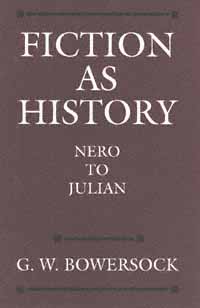 | Title: Fiction as history: Nero to Julian Author: Bowersock, G. W. (Glen Warren) 1936- Published: University of California Press, 1997 Subjects: Classics | Literature | European History | Classical Religions | Christianity | Ancient History Publisher's Description: Using pagan fiction produced in Greek and Latin during the early Christian era, G. W. Bowersock investigates the complex relationship between "historical" and "fictional" truths. This relationship preoccupied writers of the second century, a time when apparent fictions about both past and present were proliferating at an astonishing rate and history was being invented all over again. With force and eloquence, Bowersock illuminates social attitudes of this period and persuasively argues that its fiction was influenced by the emerging Christian Gospel narratives.Enthralling in its breadth and enhanced by two erudite appendices, this is a book that will be warmly welcomed by historians and interpreters of literature. [brief] Similar Items |
| 82. | 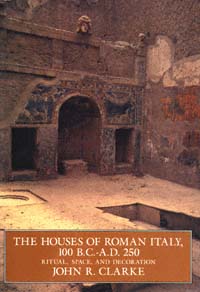 | Title: The houses of Roman Italy, 100 B.C.-A.D. 250: ritual, space, and decoration Author: Clarke, John R 1945- Published: University of California Press, 1992 Subjects: Classics | Art and Architecture | Architectural History | Art History Publisher's Description: In this richly illustrated book, art historian John R. Clarke helps us see the ancient Roman house "with Roman eyes." Clarke presents a range of houses, from tenements to villas, and shows us how enduring patterns of Roman wall decoration tellingly bear the cultural, religious, and social imprints of the people who lived with them.In case studies of seventeen excavated houses, Clarke guides us through four centuries of Roman wall painting, mosaic, and stucco decoration, from the period of the "Four Styles" (100 B.C. to A.D. 79) to the mid- third century. The First Style Samnite House shows its debt to public architecture in its clear integration of public and private spaces. The Villa of Oplontis asserts the extravagant social and cultural climate of the Second Style. Gemlike Third-Style rooms from the House of Lucretius Fronto reflect the refinement and elegance of Augustan tastes. The Vettii brothers' social climbing helps explain the overburdened Fourth-Style decoration of their famous house. And evidence of remodelling leads Clarke to conclude that the House of Jupiter and Ganymede became a gay hotel in the second century.In his emphasis on social and spiritual dimensions, Clarke offers a contribution to Roman art and architectural history that is both original and accessible to the general reader. The book's superb photographs not only support the author's findings but help to preserve an ancient legacy that is fast succumbing to modern deterioration resulting from pollution and vandalism. [brief] Similar Items |
| 83. | 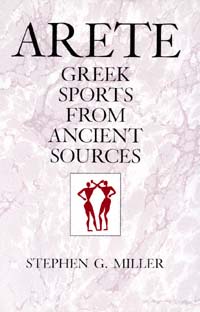 | Title: Arete: Greek sports from ancient sources Author: Miller, Stephen G Published: University of California Press, 1991 Subjects: Classics | Classical Literature and Language | History | Ancient History | Sports Publisher's Description: From the informal games of Homer's time to the highly organized contests of the Roman world, Miller has compiled a trove of ancient sources - Plutarch on boxing, Aristotle on the pentathlon, Philostratos on clay dust as an anti-perspirant and on the buying and selling of victories, Vitruvius on literary competitions, Xenophon on female body building. With fully twice as many texts as the highly successful first edition, this new version of Arete offers readers an absorbing lesson in the culture of Greek athletics from the greatest of teachers - the ancients themselves.These sources, which Miller himself has translated, provide unparalleled insights into ancient athletic practices and competitive festivals. They emphasize the fundamental role of athletics in education and shed light on such issues as the role of women in athletics and the politics and economics of the games. Ultimately they demonstrate that the concepts of virtue, skill, pride, valor, and nobility embedded in the word arete and so closely associated in the modern mind with Greek athletics are only part of the story from antiquity. [brief] Similar Items |
| 84. | 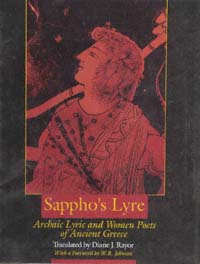 | Title: Sappho's lyre: archaic lyric and women poets of ancient Greece Author: Rayor, Diane J Published: University of California Press, 1991 Subjects: Classics | Classical Literature and Language | Literature in Translation | Poetry Publisher's Description: Sappho sang her poetry to the accompaniment of the lyre on the Greek island of Lesbos over 2500 years ago. Throughout the Greek world, her contemporaries composed lyric poetry full of passion, and in the centuries that followed the golden age of archaic lyric, new forms of poetry emerged. In this unique anthology, today's reader can enjoy the works of seventeen poets, including a selection of archaic lyric and the complete surviving works of the ancient Greek women poets - the latter appearing together in one volume for the first time. Sappho's Lyre is a combination of diligent research and poetic artistry. The translations are based on the most recent discoveries of papyri (including "new" Archilochos and Stesichoros) and the latest editions and scholarship. The introduction and notes provide historical and literary contexts that make this ancient poetry more accessible to modern readers.Although this book is primarily aimed at the reader who does not know Greek, it would be a splendid supplement to a Greek language course. It will also have wide appeal for readers of' ancient literature, women's studies, mythology, and lovers of poetry. [brief] Similar Items |
| 85. | 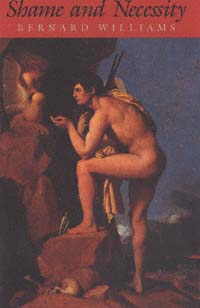 | Title: Shame and necessity Author: Williams, Bernard Arthur Owen Published: University of California Press, 1993 Subjects: Philosophy | Ethics | Classics | Classical Philosophy | Literary Theory and Criticism Publisher's Description: We tend to suppose that the ancient Greeks had primitive ideas of the self, of responsibility, freedom, and shame, and that now humanity has advanced from these to a more refined moral consciousness. Bernard Williams's original and radical book questions this picture of Western history. While we are in many ways different from the Greeks, Williams claims that the differences are not to be traced to a shift in these basic conceptions of ethical life. We are more like the ancients than we are prepared to acknowledge, and only when this is understood can we properly grasp our most important differences from them, such as our rejection of slavery.The author is a philosopher, but much of his book is directed to writers such as Homer and the tragedians, whom he discusses as poets and not just as materials for philosophy. At the center of his study is the question of how we can understand Greek tragedy at all, when its world is so far from ours.Williams explains how it is that when the ancients speak, they do not merely tell us about themselves, but about ourselves. Shame and Necessity gives a new account of our relations to the Greeks, and helps us to see what ethical ideas we need in order to live in the modern world. [brief] Similar Items |
| 86. | 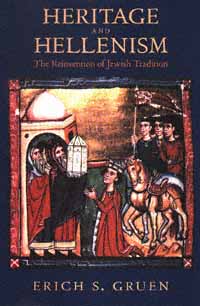 | Title: Heritage and hellenism: the reinvention of Jewish tradition Author: Gruen, Erich S Published: University of California Press, 1998 Subjects: Classics | Classical History | Classical Religions | Judaism | Ancient History | Jewish Studies Publisher's Description: The interaction of Jew and Greek in antiquity intrigues the imagination. Both civilizations boasted great traditions, their roots stretching back to legendary ancestors and divine sanction. In the wake of Alexander the Great's triumphant successes, Greeks and Macedonians came as conquerors and settled as ruling classes in the lands of the eastern Mediterranean. Hellenic culture, the culture of the ascendant classes in many of the cities of the Near East, held widespread attraction and appeal. Jews were certainly not immune. In this thoroughly researched, lucidly written work, Erich Gruen draws on a wide variety of literary and historical texts of the period to explore a central question: How did the Jews accommodate themselves to the larger cultural world of the Mediterranean while at the same time reasserting the character of their own heritage within it? Erich Gruen's work highlights Jewish creativity, ingenuity, and inventiveness, as the Jews engaged actively with the traditions of Hellas, adapting genres and transforming legends to articulate their own legacy in modes congenial to a Hellenistic setting. Drawing on a diverse array of texts composed in Greek by Jews over a broad period of time, Gruen explores works by Jewish historians, epic poets, tragic dramatists, writers of romance and novels, exegetes, philosophers, apocalyptic visionaries, and composers of fanciful fables - not to mention pseudonymous forgers and fabricators. In these works, Jewish writers reinvented their own past, offering us the best insights into Jewish self-perception in that era. [brief] Similar Items |
| 87. | 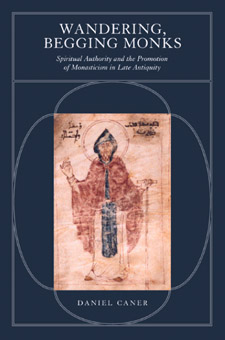 | Title: Wandering, begging monks: spiritual authority and the promotion of monasticism in late antiquity Author: Caner, Daniel Published: University of California Press, 2002 Subjects: Classics | Religion | Classical Religions | Christianity | Classical History | Ancient History Publisher's Description: An apostolic lifestyle characterized by total material renunciation, homelessness, and begging was practiced by monks throughout the Roman Empire in the fourth and fifth centuries. Such monks often served as spiritual advisors to urban aristocrats whose patronage gave them considerable authority and independence from episcopal control. This book is the first comprehensive study of this type of Christian poverty and the challenge it posed for episcopal authority and the promotion of monasticism in late antiquity. Focusing on devotional practices, Daniel Caner draws together diverse testimony from Egypt, Syria, Asia Minor, and elsewhere - including the Pseudo-Clementine Letters to Virgins, Augustine's On the Work of Monks, John Chrysostom's homilies, legal codes - to reveal gospel-inspired patterns of ascetic dependency and teaching from the third to the fifth centuries. Throughout, his point of departure is social and cultural history, especially the urban social history of the late Roman empire. He also introduces many charismatic individuals whose struggle to persist against church suppression of their chosen way of imitating Christ was fought with defiant conviction, and the book includes the first annotated English translation of the biography of Alexander Akoimetos (Alexander the Sleepless). Wandering, Begging Monks allows us to understand these fascinating figures of early Christianity in the full context of late Roman society. [brief] Similar Items |
| 88. | 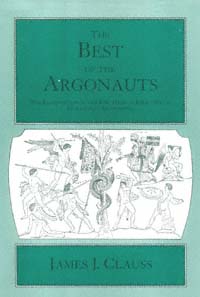 | Title: The best of the Argonauts: the redefinition of the epic hero in book one of Apollonius's Argonautica Author: Clauss, James Joseph Published: University of California Press, 1993 Subjects: Classics | Literature | Classical Literature and Language | Literary Theory and Criticism Publisher's Description: This revelatory exploration of Book One of the Argonautica rescues Jason from his status as the ineffectual hero of Apollonius' epic poem. James J. Clauss argues that by posing the question, "Who is the best of the Argonauts?" Apollonius redefines the epic hero and creates, in Jason, a man more realistic and less awesome than his Homeric predecessors, one who is vulnerable, dependent on the help of others, even morally questionable, yet ultimately successful.In bringing Apollonius' "curious and demanding poem" to life, Clauss illuminates two features of the poet's narrative style: his ubiquitous allusions to the poetry of others, especially Homer, and the carefully balanced structural organization of his episodes. The poet's subtextual interplay is explored, as is his propensity for underscoring the manipulation of the poetry of others through ring composition. [brief] Similar Items |
| 89. | 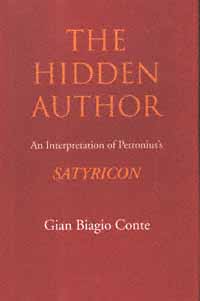 | Title: The hidden author: an interpretation of Petronius' Satyricon Author: Conte, Gian Biagio 1941- Published: University of California Press, 1997 Subjects: Classics | Classical Literature and Language | Literary Theory and Criticism Publisher's Description: The Satyricon of Petronius, a comic novel written in the first century A.D., is famous today primarily for its amazing banquet tale, "Trimalchio's Feast." But this episode is only one part of the larger picture of life during Nero's rule presented in the work. In this accessible discussion of Petronius's masterful use of parody, Gian Biagio Conte offers an interpretation of the Satyricon as a whole. He combines the scholarly precision of close reading with a significant, original theoretical model.At the heart of his interpretation, Conte reveals the technique of the "hidden author" that Petronius employs at the expense of his characters, in particular the teller of the story, Enclopius. By remaining hidden outside the narrative, Petronius invites the reader to smile at the folies de grandeur that occur in a culture of scholars and declaimers. Yet as Conte shows, behind the parody and inexhaustible humor of the Satyricon lies an unexpectedly serious lament. For those familiar with the Satyricon, as well as for new readers, Conte's book will be a reliable, enjoyable guide to the wonders the Satyricon contains. [brief] Similar Items |
| 90. | 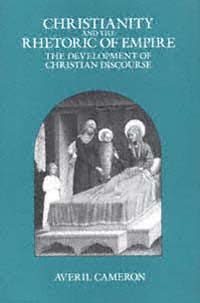 | Title: Christianity and the rhetoric of empire: the development of Christian discourse Author: Cameron, Averil Published: University of California Press, 1991 Subjects: Classics | Classical Religions | Classical History | History | Christianity | Ancient History | Rhetoric Publisher's Description: Many reasons can be given for the rise of Christianity in late antiquity and its flourishing in the medieval world. In asking how Christianity succeeded in becoming the dominant ideology in the unpromising circumstances of the Roman Empire, Averil Cameron turns to the development of Christian discourse over the first to sixth centuries A.D., investigating the discourse's essential characteristics, its effects on existing forms of communication, and its eventual preeminence. Scholars of late antiquity and general readers interested in this crucial historical period will be intrigued by her exploration of these influential changes in modes of communication.The emphasis that Christians placed on language - writing, talking, and preaching - made possible the formation of a powerful and indeed a totalizing discourse, argues the author. Christian discourse was sufficiently flexible to be used as a public and political instrument, yet at the same time to be used to express private feelings and emotion. Embracing the two opposing poles of logic and mystery, it contributed powerfully to the gradual acceptance of Christianity and the faith's transformation from the enthusiasm of a small sect to an institutionalized world religion. [brief] Similar Items |
| 91. | 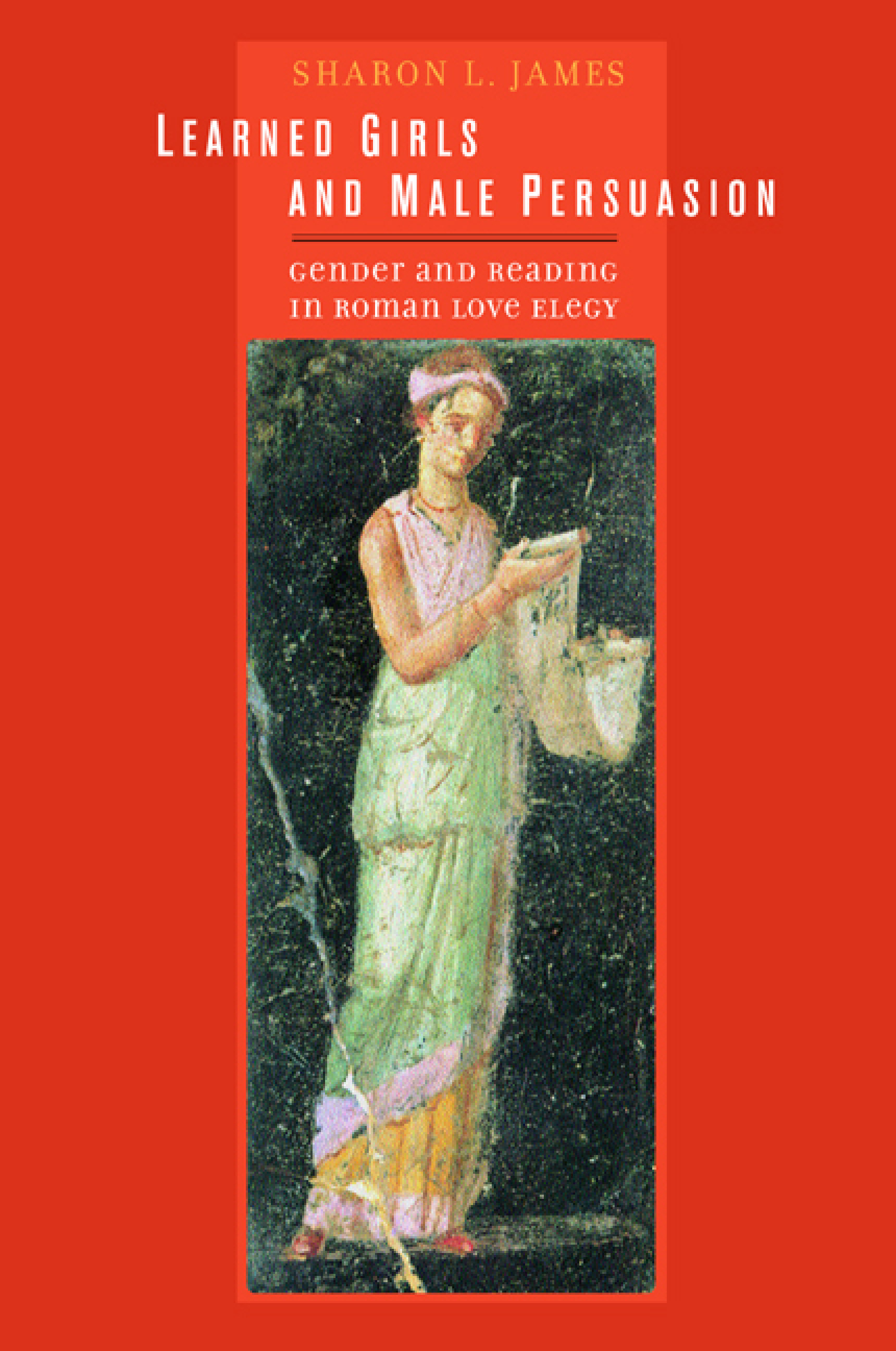 | Title: Learned girls and male persuasion: gender and reading in Roman love elegy Author: James, Sharon L Published: University of California Press, 2003 Subjects: Classics | Classical Literature and Language | Literature | Poetry | Women's Studies Publisher's Description: This study transforms our understanding of Roman love elegy, an important and complex corpus of poetry that flourished in the late first century b.c.e. Sharon L. James reads key poems by Propertius, Tibullus, and Ovid for the first time from the perspective of the woman to whom they are addressed - the docta puella, or learned girl, the poet's beloved. By interpreting the poetry not, as has always been done, from the stance of the elite male writers - as plaint and confession - but rather from the viewpoint of the women - thus as persuasion and attempted manipulation - James reveals strategies and substance that no one has listened for before. [brief] Similar Items |
| 92. | 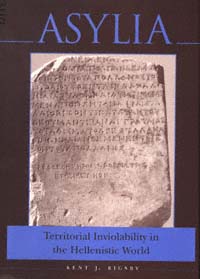 | Title: Asylia: territorial inviolability in the Hellenistic world Author: Rigsby, Kent J 1945- Published: University of California Press, 1997 Subjects: Classics | Ancient History | Politics | Classical History | Classical Religions | Classical Politics Publisher's Description: In the Hellenistic period certain Greek temples and cities came to be declared "sacred and inviolable." Asylia was the practice of declaring religious places precincts of asylum, meaning they were immune to violence and civil authority. The evidence for this phenomenon - mainly inscriptions and coins - is scattered in the published record. The material has never been collected and presented in one publication until now.Kent J. Rigsby lays out these documents and discusses their historical implications in a substantial introduction. He argues that while a hopeful intention of military neutrality lay behind the institution of asylum, the declarations did not in fact change military behavior. Instead, "declared inviolability" became a civic and religious honor for which cities across the Greek world competed during the third to first centuries B.C. [brief] Similar Items |
| 93. | 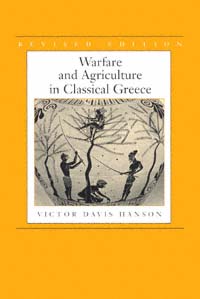 | Title: Warfare and agriculture in classical Greece Author: Hanson, Victor Davis Published: University of California Press, 1998 Subjects: Classics | Classical History | Military History | Ancient History | Classical Politics | Agriculture Publisher's Description: The ancient Greeks were for the most part a rural, not an urban, society. And for much of the Classical period, war was more common than peace. Almost all accounts of ancient history assume that farming and fighting were critical events in the lives of the citizenry. Yet never before have we had a comprehensive modern study of the relationship between agriculture and warfare in the Greek world. In this completely revised edition of Warfare and Agriculture in Classical Greece , Victor Davis Hanson provides a systematic review of Greek agriculture and warfare and describes the relationship between these two important aspects of life in ancient communities. With careful attention to agronomic as well as military details, this well-written, thoroughly researched study reveals the remarkable resilience of those farmland communities.In the past, scholars have assumed that the agricultural infrastructure of ancient society was often ruined by attack, as, for example, Athens was relegated to poverty in the aftermath of the Persian and later Peloponnesian invasions. Hanson's study shows, however, that in reality attacks on agriculture rarely resulted in famines or permanent agrarian depression. Trees and vines are hard to destroy, and grainfields are only briefly vulnerable to torching. In addition, ancient armies were rather inefficient systematic ravagers and instead used other tactics, such as occupying their enemies' farms to incite infantry battle. Warfare and Agriculture in Classical Greece suggests that for all ancient societies, rural depression and desolation came about from more subtle phenomena - taxes, changes in political and social structure, and new cultural values - rather than from destructive warfare. [brief] Similar Items |
| 94. | 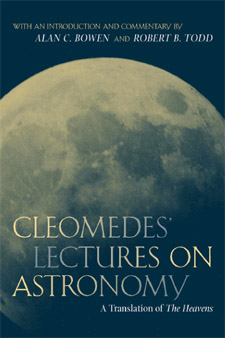 | Title: Cleomedes' lectures on astronomy: a translation of The heavens Author: Cleomedes Published: University of California Press, 2004 Subjects: Classics | Science | Astronomy | History of Science | Classical Philosophy Publisher's Description: At some time around 200 A.D., the Stoic philosopher and teacher Cleomedes delivered a set of lectures on elementary astronomy as part of a complete introduction to Stoicism for his students. The result was The Heavens (Caelestia), the only work by a professional Stoic teacher to survive intact from the first two centuries A.D., and a rare example of the interaction between science and philosophy in late antiquity. This volume contains a clear and idiomatic English translation - the first ever - of The Heavens, along with an informative introduction, detailed notes, and technical diagrams. This important work will now be accessible to specialists in both ancient philosophy and science and to readers interested in the history of astronomy and cosmology but with no knowledge of ancient Greek. [brief] Similar Items |
| 95. | 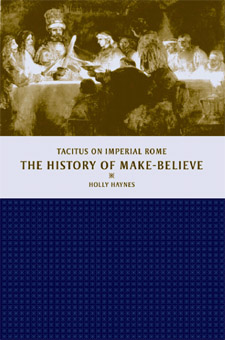 | Title: The history of make-believe: Tacitus on imperial Rome Author: Haynes, Holly Published: University of California Press, 2003 Subjects: Classics | Classical History | Classical Literature and Language | Political Theory | Ancient History Publisher's Description: A theoretically sophisticated and illuminating reading of Tacitus, especially the Histories , this work points to a new understanding of the logic of Roman rule during the early Empire. Tacitus, in Holly Haynes' analysis, does not write about the reality of imperial politics and culture but about the imaginary picture that imperial society makes of these concrete conditions of existence - the "making up and believing" that figure in both the subjective shaping of reality and the objective interpretation of it. Haynes traces Tacitus's development of this fingere/credere dynamic both backward and forward from the crucial year A.D. 69. Using recent theories of ideology, especially within the Marxist and psychoanalytic traditions, she exposes the psychic logic lurking behind the actions and inaction of the protagonists of the Histories . Her work demonstrates how Tacitus offers penetrating insights into the conditions of historical knowledge and into the psychic logic of power and its vicissitudes, from Augustus through the Flavians. By clarifying an explicit acknowledgment of the difficult relationship between res and verba, in the Histories, Haynes shows how Tacitus calls into question the possibility of objective knowing - how he may in fact be the first to allow readers to separate the objectively knowable from the objectively unknowable. Thus, Tacitus appears here as going further toward identifying the object of historical inquiry - and hence toward an "objective" rendering of history - than most historians before or since. [brief] Similar Items |
| 96. | 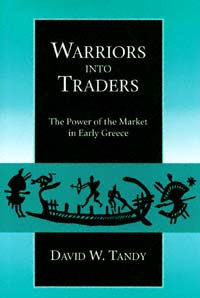 | Title: Warriors into traders: the power of the market in early Greece Author: Tandy, David W Published: University of California Press, 1997 Subjects: Classics | Ancient History | Classical History | Economics and Business | Anthropology | Politics Publisher's Description: The eighth century dawned on a Greek world that had remained substantially unchanged during the centuries of stagnation known as the Dark Age. This book is a study of the economic and cultural upheaval that shook mainland Greece and the Aegean area in the eighth century, and the role that poetry played in this upheaval. Using tools from political and economic anthropology, David Tandy argues that between about 800 and 700 B.C., a great transformation of dominant economic institutions took place involving wrenching adjustments in the way status and wealth were distributed within the Greek communities.Tandy explores the economic organization of preindustrial societies, both ancient and contemporary, to shed light on the Greek experience. He argues that the sudden shift in Greek economic formations led to new social behaviors and to new social structures such as the polis , itself a by-product of economic change. Unraveling the dialectic between the material record and epic poetry, Tandy shows that the epic tradition mirrored these new social behaviors and that it portrayed the stresses that economic change brought to the ancient Aegean world.Tandy brings in comparative evidence from other small-scale communities beset by changes, spotlighting the specific plight of one community, Ascra in Boeotia, on whose behalf Hesiod sang his Works and Days . The result is a lively, moving account of a human dilemma that, many centuries later, is all too familiar. [brief] Similar Items |
| 97. | 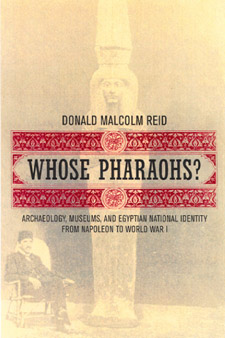 | Title: Whose pharaohs?: archaeology, museums, and Egyptian national identity from Napoleon to World War I Author: Reid, Donald M. (Donald Malcolm) 1940- Published: University of California Press, 2002 Subjects: History | Middle Eastern History | European History | Middle Eastern Studies | Classics | Art History Publisher's Description: Egypt's rich and celebrated ancient past has served many causes throughout history--in both Egypt and the West. Concentrating on the era from Napoleon's conquest and the discovery of the Rosetta Stone to the outbreak of World War I, this book examines the evolution of Egyptian archaeology in the context of Western imperialism and nascent Egyptian nationalism. Traditionally, histories of Egyptian archaeology have celebrated Western discoverers such as Champollion, Mariette, Maspero, and Petrie, while slighting Rifaa al-Tahtawi, Ahmad Kamal, and other Egyptians. This exceptionally well-illustrated and well-researched book writes Egyptians into the history of archaeology and museums in their own country and shows how changing perceptions of the past helped shape ideas of modern national identity. Drawing from rich archival sources in Egypt, the United Kingdom, and France, and from little-known Arabic publications, Reid discusses previously neglected topics in both scholarly Egyptology and the popular "Egyptomania" displayed in world's fairs and Orientalist painting and photography. He also examines the link between archaeology and the rise of the modern tourist industry. This richly detailed narrative discusses not only Western and Egyptian perceptions of pharaonic history and archaeology but also perceptions of Egypt's Greco-Roman, Coptic, and Islamic eras. Throughout this book, Reid demonstrates how the emergence of archaeology affected the interests and self-perceptions of modern Egyptians. In addition to uncovering a wealth of significant new material on the history of archaeology and museums in Egypt, Reid provides a fascinating window on questions of cultural heritage--how it is perceived, constructed, claimed, and contested. [brief] Similar Items |
| 98. | 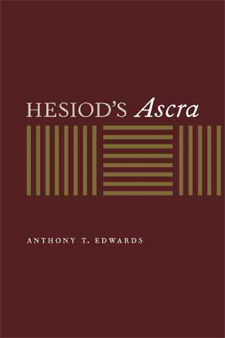 | Title: Hesiod's Ascra Author: Edwards, Anthony T Published: University of California Press, 2004 Subjects: Classics | Classical History | Classical Politics | Classical Literature and Language | Economics and Business Publisher's Description: In Works and Days, one of the two long poems that have come down to us from Hesiod, the poet writes of farming, morality, and what seems to be a very nasty quarrel with his brother Perses over their inheritance. In this book, Anthony T. Edwards extracts from the poem a picture of the social structure of Ascra, the hamlet in northern Greece where Hesiod lived, most likely during the seventh century b.c.e. Drawing on the evidence of trade, food storage, reciprocity, and the agricultural regime as Hesiod describes them in Works and Days, Edwards reveals Ascra as an autonomous village, outside the control of a polis, less stratified and integrated internally than what we observe even in Homer. In light of this reading, theconflict between Hesiod and Perses emerges as a dispute about the inviolability of the community's external boundary and the degree of interobligation among those within the village. Hesiod's Ascra directly counters the accepted view of Works and Days, which has Hesiod describing a peasant society subordinated to the economic and political control of an outside elite. Through his deft analysis, Edwards suggests a new understanding of both Works and Days and the social and economic organization of Hesiod's time and place. [brief] Similar Items |
| 99. | 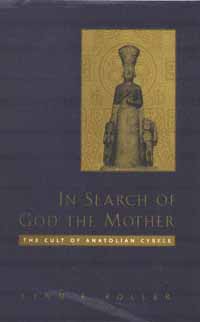 | Title: In search of god the mother: the cult of Anatolian Cybele Author: Roller, Lynn E Published: University of California Press, 1999 Subjects: Classics | Archaeology | Ancient History | Gender Studies | Women's Studies | Religion | Comparative Religions Publisher's Description: This book examines one of the most intriguing figures in the religious life of the ancient Mediterranean world, the Phrygian Mother Goddess, known to the Greeks and Romans as Cybele or Magna Mater, the Great Mother. Her cult was particularly prominent in central Anatolia (modern Turkey), and spread from there through the Greek and Roman world. She was an enormously popular figure, attracting devotion from common people and potentates alike. This book is the first comprehensive assembly and discussion of the entire extant evidence concerning the worship of the Phrygian Mother Goddess, from her earliest appearance in the prehistoric record to the early centuries of the Roman Empire.Lynn E. Roller presents and analyzes literary, historiographic, and archaeological data with equal acuity and flair. While previous studies have tended to emphasize the more outrageous aspects of the Mother Goddess's cult, such as her orgiastic rituals and the eunuch priests who attended her, this book places a special focus on Cybele's position in Anatolia and the ways in which the identity of the goddess changed as her cult was transmitted to Greece and Rome. Roller gives a detailed account of the growth, spread, and evolution of her cult, her ceremonies, and her meaning for her adherents.This book will introduce students of Classical antiquity to many aspects of the Great Mother which have been previously unexamined, and will interest anyone who has ever been piqued by curiosity about the Mother Goddess of the ancient Western world. [brief] Similar Items |
| 100. | 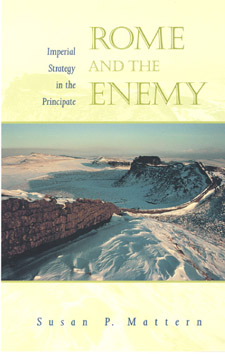 | Title: Rome and the enemy: imperial strategy in the principate Author: Mattern, Susan P 1966- Published: University of California Press, 1999 Subjects: Classics | Classical History | Classical Politics | Classical Literature and Language | Military History | Ancient History Publisher's Description: How did the Romans build and maintain one of the most powerful and stable empires in the history of the world? This illuminating book draws on the literature, especially the historiography, composed by the members of the elite who conducted Roman foreign affairs. From this evidence, Susan P. Mattern reevaluates the roots, motivations, and goals of Roman imperial foreign policy especially as that policy related to warfare. In a major reinterpretation of the sources, Rome and the Enemy shows that concepts of national honor, fierce competition for status, and revenge drove Roman foreign policy, and though different from the highly rationalizing strategies often attributed to the Romans, dictated patterns of response that remained consistent over centuries. Mattern reconstructs the world view of the Roman decision-makers, the emperors, and the elite from which they drew their advisers. She discusses Roman conceptions of geography, strategy, economics, and the influence of traditional Roman values on the conduct of military campaigns. She shows that these leaders were more strongly influenced by a traditional, stereotyped perception of the enemy and a drive to avenge insults to their national honor than by concepts of defensible borders. In fact, the desire to enforce an image of Roman power was a major policy goal behind many of their most brutal and aggressive campaigns. Rome and the Enemy provides a fascinating look into the Roman mind in addition to a compelling reexamination of Roman conceptions of warfare and national honor. The resulting picture creates a new understanding of Rome's long mastery of the Mediterranean world. [brief] Similar Items |